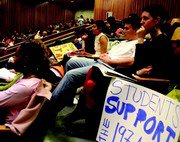News: Manhattanville Expansion
-----------------------------------------------------------------

FRANCIS BARTUS�STAFF PHOTOGRAPHER
Of the 70 people who spoke at the scoping meeting addressing the proposed Manhattanville expansion, none expressed unqualified support.
--------------------------------------
CU Expansion Foes Go On the Record
Fears of Eminent Domain, Displacement Voiced at Formal Meeting With City
By Erin Durkin
Spectator Staff Writer
November 16, 2005
Two years of anger spilled out over the course of six-and-a-half hours Tuesday night at the first official meeting regarding Columbia�s Manhattanville expansion plan.
�Tonight, we, the people of Harlem, are making history in our complete opposition to Columbia�s 17-acre land grab,� said Harlem Tenants� Council president Nellie Bailey.
The Department of City Planning, which conducted the scoping session, cautioned attendees to confine their remarks to the contents of the draft scope prepared by Columbia for its Environmental Impact Statement. But it quickly became clear that there was little chance of that rule being followed, as audience members rose one after another to mount wholesale denunciations of an expansion plan that they think will displace them from their neighborhood.
More than 70 people spoke at the meeting, many battling to finish their statements as Robert Dobruskin, director of environmental assessment and review for the Department of City Planning, rang a service bell indicating the expiration of their three-minute time limit. A few continued to speak until their microphones were cut off.
University officials gave a brief overview of their plans for a new campus, and while restricting their presentation to technical details, they repeatedly stated that they are committed to working with the community throughout the expansion process. Numerous Columbia officials related to the project sat in the audience as observers.
But no one not employed by the University expressed support for Columbia�s plans in their current form.
Speaking first, Community Board 9 chairman Jordi Reyes-Montblanc set the tone for the night with a denunciation of eminent domain and plea for Columbia to complete its expansion within the parameters of the board�s 197-A plan. These themes were repeated by many during the course of meeting.
These requests were accompanied by personal expressions of fear about displacement and plenty of fiery rhetoric against Columbia.
Speaking quickly, civil rights lawyer Norman Siegel, who represents business owners in the expansion area who have refused to sell to Columbia, listed more than a dozen specific recommendations for the scope of the EIS. �This is David versus Goliath. We are David, you are Goliath. David won, and we will win,� he said, raising his fist in the air as he walked back to his seat amid thunderous applause.
�Columbia University�s conduct, as it has been throughout the entire scoping process, is that of a typical, racist, arrogant [institution that gives] distrustful lies, disinformation and misinformation,� Bailey said. �We must mount a campaign of resistance and fight back, because if we don�t, we will not be here, our children will not be here, and we will not recognize this place. And we must do it together, and we must hear the voices of the people of color. You cannot step back; you have to speak out.� The auditorium exploded into cheers as she concluded her response.
The few elected officials in attendance expressed solidarity with the community.
�No discussion can really begin when you have eminent domain on the table,� said outgoing city councilman Bill Perkins (D-Harlem).
Manhattan Borough President-elect Scott Stringer, whose office will play a role in approving Columbia�s rezoning of Manhattanville, agreed.
�We have a wonderful opportunity when a school of this magnitude comes to a community and wants to expand�, he said, adding, �Part of what we have to recognize is that Columbia left to its own devices, unchecked, will use eminent domain ... I want you to know clearly where I stand. That is unacceptable.�
A series of Columbia students from the Student Coalition on Expansion and Gentrification challenged the plan as well.
�There are some racist and classist implications when you allow the administration to sit in Low Library and make decisions for a minority working class and poor community,� said Brett Murphy, BC �07.
Consultants from West Harlem Environmental Action, a non-profit environmental advocacy group, addressed what they saw as specific deficiencies in the content of Columbia�s draft scope.
�This is a totally inadequate draft scope,� said Swati Prakish of WEACT. �It�s not complete.�
Several residents of 3289 Broadway, a city-owned building that Columbia seeks to acquire for the expansion project, expressed fears that tenants would be turned out of their apartments.
�Where are we going to go?� asked Mary Granada, who lives in the building.
The raucous crowd dissipated somewhat as the event stretched into the night.
�Seventy people have spoken, and there wasn�t one in favor,� Reyes-Montblanc said, noting that he had been told by city planning officials that they had never attended a scoping session where opposition was so unanimous.



No comments:
Post a Comment